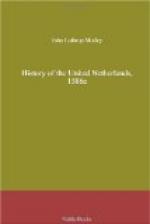No, doubt it was a most illiberal and unwise policy for the inhabitants of the independent States to exclude from office the wanderers, for conscience’ sake, from the obedient Provinces. They should have been welcomed heart and hand by those who were their brethren in religion and in the love of freedom. Moreover, it was notorious that Hohenlo, lieutenant-general under Maurice of Nassau, was a German, and that by the treaty with England, two foreigners sat in the state council, while the army swarmed with English, Irish, end German officers in high command. Nevertheless, violently to subvert the constitution of a Province, and to place in posts of high responsibility men who were ineligible—some whose characters were suspicious, and some who were known to be dangerous, and to banish large numbers of respectable burghers—was the act of a despot.
Besides their democratic doctrines, the Leicestrians proclaimed and encouraged an exclusive and rigid Calvinism.
It would certainly be unjust and futile to detract from the vast debt which the republic owed to the Geneva Church. The reformation had entered the Netherlands by the Walloon gate. The earliest and most eloquent preachers, the most impassioned converts, the sublimest martyrs, had lived, preached, fought, suffered, and died with the precepts of Calvin in their hearts. The fire which had consumed the last vestige of royal and sacerdotal despotism throughout the independent republic, had been lighted by the hands of Calvinists.
Throughout the blood-stained soil of France, too, the men who were fighting the same great battle as were the Netherlanders against Philip II. and the Inquisition, the valiant cavaliers of Dauphiny and Provence, knelt on the ground, before the battle, smote their iron breasts with their mailed hands, uttered a Calvinistic prayer, sang a psalm of Marot, and then charged upon Guise, or upon Joyeuse, under the white plume of the Bearnese. And it was on the Calvinist weavers and clothiers of Rochelle that the great Prince relied in the hour of danger as much as on his mountain chivalry. In England too, the seeds of liberty, wrapped up in Calvinism and hoarded through many trying years, were at last destined to float over land and sea, and to bear large harvests of temperate freedom for great commonwealths, which were still unborn. Nevertheless there was a growing aversion in many parts of the States for the rigid and intolerant spirit of the reformed religion. There were many men in Holland who had already imbibed the true lesson—the only, one worth learning of the reformation—liberty of thought; but toleration in the eyes of the extreme Calvinistic party was as great a vice as it could be in the estimation of Papists. To a favoured few of other habits of thought, it had come to be regarded as a virtue; but the day was still far distant when men were to scorn the very word toleration as an insult to the dignity of man; as if for any human being or set of human beings, in caste, class, synod, or church, the right could even in imagination be conceded of controlling the consciences of their fellow-creatures.




